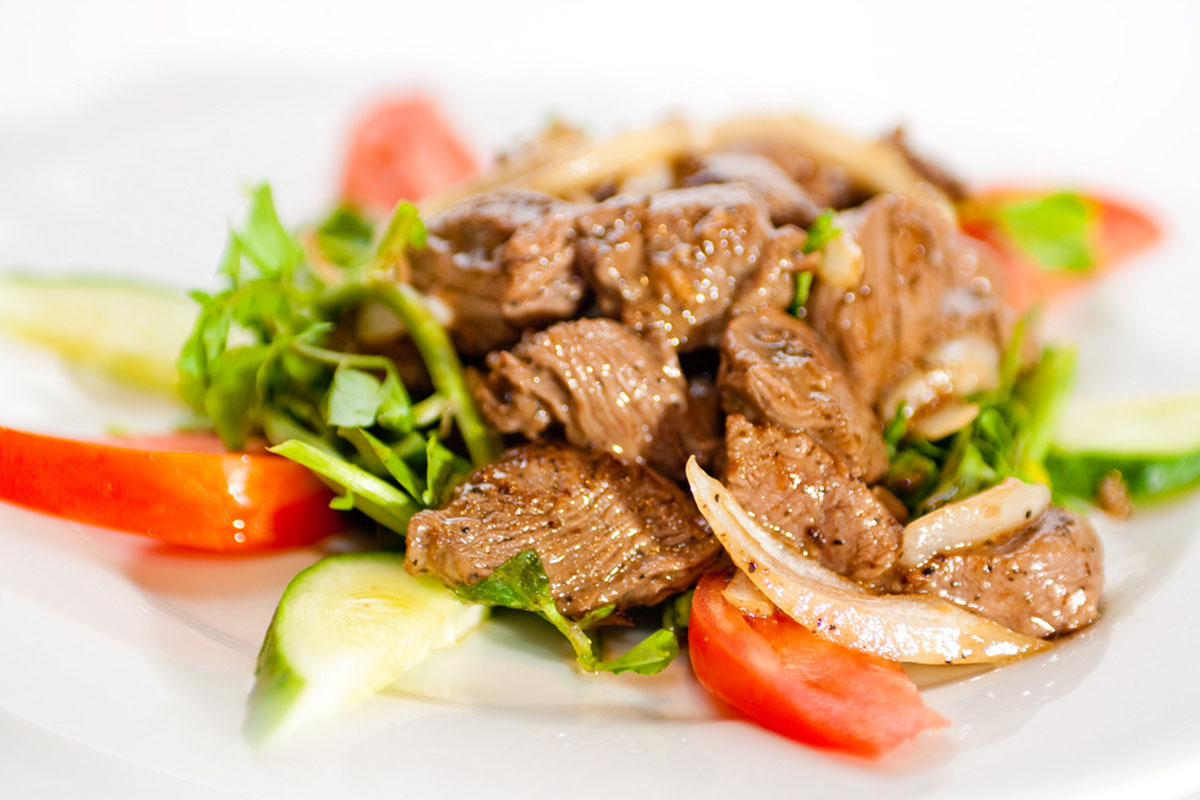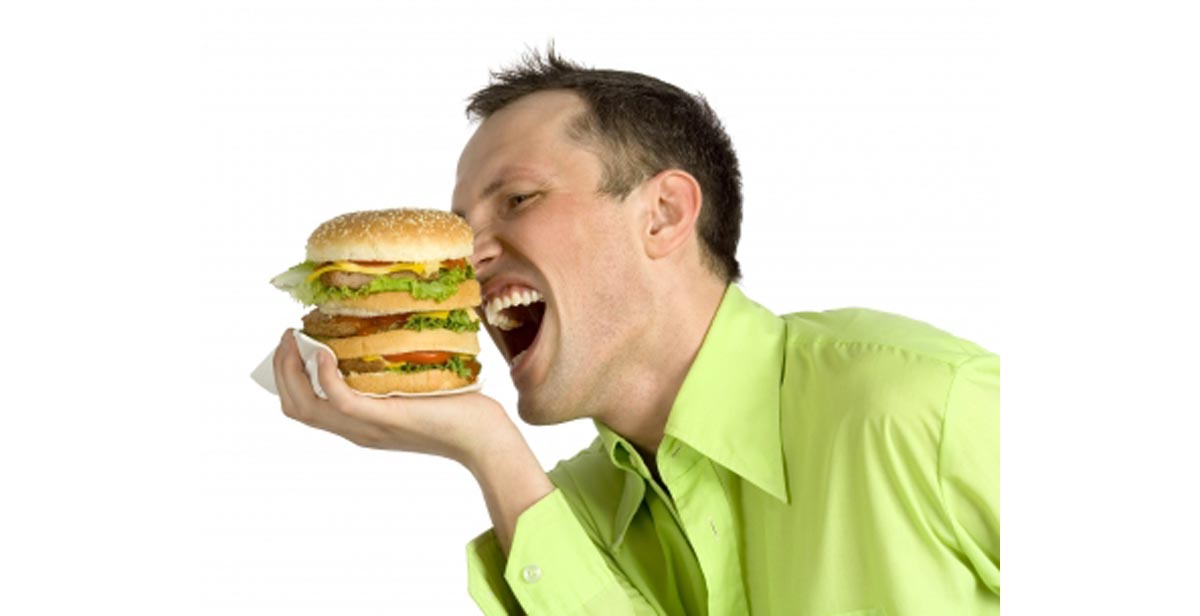Countless supplement sellers want you to buy their muscle-building supplements, and not a few sports nutrition experts have detailed advice about what to eat to get maximum benefits from minimum workout time.
Make Sure Carb Loading Does Not Turn Into Fat Loading
The most important dietary change for getting more from your workouts, however, may not be what you eat, but what you don't. I'll give you a sample workout menu at the end of this article, but first I'd like to explain some basic principles.

It helps to think of your body as constantly improving, not just during workout and recovery. To build muscle, you need growth hormone. For a mere $10,000 a week, you might be able to persuade a doctor to give you injections of synthetic, recombinant growth hormone, although there are significant risks with growth hormone replacement. Or you might stimulate your body to make the right amount of growth hormone for your optimum muscle growth by observing this one dietary principle:
The human body makes growth hormone to preserve muscle tissue during starvation.
You stimulate growth hormone product by what you don't eat, not by what you do. Maximum growth hormone production occurs after about 48 to 72 hours of fasting, but there is no need to go without food that long. In fact, you still need the replenish your muscles (more about that in a moment) after every workout. But you need at least some periods of 12 to 18 hours in which you don't work out and you don't eat, at all, so your body can make more growth hormone.
The human body makes growth hormone to preserve muscle tissue during starvation.
You stimulate growth hormone product by what you don't eat, not by what you do. Maximum growth hormone production occurs after about 48 to 72 hours of fasting, but there is no need to go without food that long. In fact, you still need the replenish your muscles (more about that in a moment) after every workout. But you need at least some periods of 12 to 18 hours in which you don't work out and you don't eat, at all, so your body can make more growth hormone.
But what about eating during and immediately after workouts?
Your muscles bulk out with a substance called glycogen. It's a chemical combination of glucose and water. You need both glucose and water immediately after you work out so your muscles can make the glycogen they need both for energy storage and to pump themselves up.
Stored glycogen both adds to muscle mass and provides muscles with an energy supply that does not have to be delivered through the bloodstream while you are working out.
How much sugar do you need for your muscles to make glycogen? Assuming you are not a diabetic, about 0.4 gram of carbohydrates for every kilogram you weight (or 2 calories in carbohydrates for every pound) is optimum for muscle recovery over about a six-hour period after you work out, as long as you don't replace more calories than you have burned.
For instance, if you weigh 150 pounds, and you have lifted weights, spent half an hour on an elliptical trainer, jumped rope, and done so rowing, burning 500 calories, you still need about 300 calories during the six hours after your workout to get the most benefit for your muscles. This amount of sugar stimulates growth hormone for your entire body. You can consume part of these 300 calories during your workout if you like, but don't consume more afterward.
But if you weigh 150 pounds, and you walked around the block and then plopped down on the couch to watch television, you don't need 450 calories in energy replacement. If you are very out of shape, even walking around the block can stimulate growth hormone. You may actually burn off 100 calories or so very fast. You need to replace those 100 calories for your muscles to benefit. But if you eat excess calories, you will put on excess fat. And whether you work out long and hard or your workout is short and easy, your body has to get water to use the carbs.
Stored glycogen both adds to muscle mass and provides muscles with an energy supply that does not have to be delivered through the bloodstream while you are working out.
How much sugar do you need for your muscles to make glycogen? Assuming you are not a diabetic, about 0.4 gram of carbohydrates for every kilogram you weight (or 2 calories in carbohydrates for every pound) is optimum for muscle recovery over about a six-hour period after you work out, as long as you don't replace more calories than you have burned.
For instance, if you weigh 150 pounds, and you have lifted weights, spent half an hour on an elliptical trainer, jumped rope, and done so rowing, burning 500 calories, you still need about 300 calories during the six hours after your workout to get the most benefit for your muscles. This amount of sugar stimulates growth hormone for your entire body. You can consume part of these 300 calories during your workout if you like, but don't consume more afterward.
But if you weigh 150 pounds, and you walked around the block and then plopped down on the couch to watch television, you don't need 450 calories in energy replacement. If you are very out of shape, even walking around the block can stimulate growth hormone. You may actually burn off 100 calories or so very fast. You need to replace those 100 calories for your muscles to benefit. But if you eat excess calories, you will put on excess fat. And whether you work out long and hard or your workout is short and easy, your body has to get water to use the carbs.
What to Do About Protein for Your Workouts
Muscles bulk up with glycogen they make from glucose and water. They rebuild muscle fibers, the part of the muscle that actually does the work, with amino acids from proteins.
Amino acids are especially well absorbed for about two hours after you exercise. That is because muscle cells are temporarily about 50 times more responsive to insulin, which is involved in transporting not just sugars but also amino acids. Consuming some carbohydrate (if you are not a type 1 diabetic) stimulates your pancreas to release insulin, and the insulin helps muscles receive both the glucose they need to build bulk and the protein they need to build strength. If they don't get these nutrients during the two hours after you exercise, they recover much more slowly later because the sensitivity to insulin wears off.
 The faster the protein is digested, the more readily the amino acids travel through your bloodstream to your muscles. Generally, serious athletes consume whey protein (isolated from milk) or pea protein (isolated from various peas and lentils). These powders, mixed with some sugar and water to make a recovery shake, provide the nutrients muscles need to benefit from exercise. You don't absolutely have to have them to build muscle after exercise, but you run the risk of tearing down muscle if you work out before your muscles have a chance to recover. Recovery drinks you make by mixing whey or pea protein with glucose and flavorings into water after a workout help you workout more often with better results.
The faster the protein is digested, the more readily the amino acids travel through your bloodstream to your muscles. Generally, serious athletes consume whey protein (isolated from milk) or pea protein (isolated from various peas and lentils). These powders, mixed with some sugar and water to make a recovery shake, provide the nutrients muscles need to benefit from exercise. You don't absolutely have to have them to build muscle after exercise, but you run the risk of tearing down muscle if you work out before your muscles have a chance to recover. Recovery drinks you make by mixing whey or pea protein with glucose and flavorings into water after a workout help you workout more often with better results.
But there is no food or combination of foods that is even 5% as effective as getting a good night's sleep and at least 12 hours without meals or snacks for stimulating growth hormone. Eating the "right" workout foods is essential to muscle growth. They help stimulate growth hormone a little. Getting good sleep and avoiding constant eating stimulate growth hormone a lot.
Amino acids are especially well absorbed for about two hours after you exercise. That is because muscle cells are temporarily about 50 times more responsive to insulin, which is involved in transporting not just sugars but also amino acids. Consuming some carbohydrate (if you are not a type 1 diabetic) stimulates your pancreas to release insulin, and the insulin helps muscles receive both the glucose they need to build bulk and the protein they need to build strength. If they don't get these nutrients during the two hours after you exercise, they recover much more slowly later because the sensitivity to insulin wears off.

But there is no food or combination of foods that is even 5% as effective as getting a good night's sleep and at least 12 hours without meals or snacks for stimulating growth hormone. Eating the "right" workout foods is essential to muscle growth. They help stimulate growth hormone a little. Getting good sleep and avoiding constant eating stimulate growth hormone a lot.
So what are the best foods for a workout?
- Before and during your workout, stay hydrated. A no-calorie drink with electrolytes would be best (and that could be as simple as water with a pinch of salt).
- During your workout, if feel nervous, dizzy, or shaky, stop and eat a small amount of a high-carb food. Weight lifting burns enormous amounts of carbohydrate very fast and may make some people hypoglycemic.
- After your workout, replenish sugars and protein with a modest amount of a whey or pea protein energy drink. A good rule of thumb is to consume no more than 3 calories per pound (or 6 calories per kilo) during the six hours after you workout. Don't wolf down raw eggs, hamburgers, steaks, or whole apple pies after you go to the gym. Hydrolysated proteins are absorbed faster than "regular food" proteins, but only about 10% faster. If you are not on a professional sports team, you probably don't need the small amount of faster absorption.
- Give your body a chance to rest and recover. Get good sleep every night. Pulses of growth hormone up to 2000% higher than your daytime levels repair muscles and keep the rest of your body humming.
- Take a break from eating at least every day or two for at least 12 hours. If you don't eat constantly, your body gets the message that it needs to preserve muscle mass with growth hormone. But don't do a heavy workout during your fasting period.
- Gilbert JA, Bendsen NT, Tremblay A, Astrup A. Effect of proteins from different sources on body composition. Nutr Metab Cardiovasc Dis. 2011 May 10. [Epub ahead of print]
- Photo courtesy of cayce on Flickr: http://www.flickr.com/photos/cayce/1909040Photo courtesy of Nick Nguyen by Flickr : http://www.flickr.com/photos/nicktakespics/3658284817/

